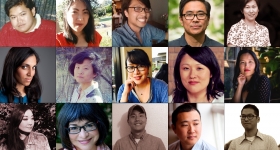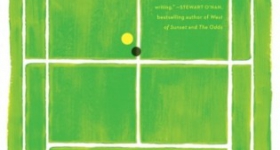Perhaps appropriate to New Waves' online setting, I first came across Kevin Nguyen’s debut novel when a Goodreads algorithm suggested it to me. The book follows the friendship of Lucas, a Vietnamese tech employee whom Nguyen describes as “bumbly,” and Margo, a decisive black woman at the top of her field. After Margo dies in a car accident, Lucas discovers the different versions of his friend that existed at work, at home and online, and he goes through a chaotic grieving process that traverses tech bros, Paris by Night, flaming Benihana onion volcanoes, pretentious speakeasies, bossa nova and girls who code, among many other things. Nguyen is humorous and precise, capturing the complexities of navigating workplaces and living as a POC in an online world. I met with him last month to talk about being an Asian American writer and how his background informed his characters.
I’ve read books written by older generations of Asian American writers who tend to focus on immigration and assimilation, while New Waves is centered on millennials and a more contemporary POC experience. Did you intend or feel like you were writing something new?
I think part of writing is you want to put something out in the world that you would want to read, and oftentimes that’s something you haven’t seen yet. There are second-gen stories but not a lot of them. It’s probably five years ago now that I started writing this, but there was this time when it felt like in every story about a POC, the racism in the book was killing people. And that’s not to say those books aren’t good or that racism doesn’t kill people, but for a majority of people I know, the way racism manifests itself on a daily basis is more of a nagging, a constant pinprick or weight that bears down, and less of a violence or attack. So that’s partly why I wanted to write a story like that. I think it’s very second gen to experience racism that way, and another thing is that the second gen story is for other people who look like us or who have that experience. It’s uninteresting to white people. The white gaze wants racism to be a plot device, not just a texture you have to live with, and that’s not often reflected in literature.
A lot of the book depends on the characters’ location in New York. Did you have a culture shock when you moved here, in terms of race?
I lived in Seattle for a long time, but I’m from Boston where I think it’s worse. It’s hard to say if it was the place or the decade I was in. I think, weirdly, in New York I’ve been called a chink more often than anywhere else, but also the people you meet are interacting with people with very different life experiences from them, so in some ways New York is the easiest place I’ve lived. You see it in the book, the friendship between Lucas, who’s a Vietnamese Chinese American, and Margo, who’s African American. They relate in the sense that they both understand their workplace is racist, but they also don’t understand each other’s experiences. They talk past each other, which I feel like I did a lot of when I was in my early 20s.
I did the same thing in college. There are not many Vietnamese people in New York so I would hang out with people from Queens and go to a lot of Chinese cultural events, and it felt like a sort of solidarity but not really.
The funny thing about Asian America is — there’s actually a good line about it in Minor Feelings, something like China is to Asians what Kleenex is to tissues. They’re just synonymous for people. There are a lot more Chinese in the United States than any other Asian group, but their experience, which is broad and wide, still somehow dominates any discussion of Asian Americans. Asian American solidarity is funny because what do we actually have in common with Chinese people? Some cultural stuff but not that much. Food: no; language: no; we kind of look alike, maybe Vietnamese and Chinese people a little more than Filipino and Chinese, but we seem to overinvest in that idea of solidarity.
Did you have that experience while working in tech?
In some ways everyone in tech is a little ignorant. Everyone thinks they’re socially conscious and probably thought they were woke before people were saying that, so there’s a kind of disingenuous thing going on. What’s interesting about tech is that there are a lot of Asian Americans, but they’re all Chinese and they’re all engineers, so there were a lot of times I was assumed to be an engineer but I wasn’t. It’s probably the way I relate to Lucas.
Were you ever scared of being slotted as an Asian writer or of being tokenized?
Yeah, more afraid of being tokenized. The point of view of the book is told by an Asian male, but he’s one of three main characters so it’s not really an Asian book. It’s kind of funny, there’s this book festival and you just agree to do it. They put you on a panel and you don’t find out the panel for a couple of months and the whole time I was like, it’s going to be an Asian panel, it’s going to be an Asian panel, and it came in yesterday and I was like, yup. It’s a good panel, it’s all writers I think are awesome, but the title was something like Asian Power blah blah.
I think the internet used to be viewed as a more fun place, but now people are throwing away their phones and talking about how terrible being online is. The main characters initially form their relationships through online forums, and I was wondering if you were ever on similar sites?
The book takes place in a pre-social media world, so I have nostalgia for internet forums. I don’t want to be too nostalgic, like the internet was always this wonderful place — it was a lot whiter in a lot of ways. But something feels lost now that everything is at scale and we use our real names. For a while I ran a now defunct, very earnest literary blog, so I was writing and editing on that for seven years, but never with the intention that it would lead to anything remotely lucrative or a career. It was this era of the internet where you could make a blog and people would read it, and now you can’t really do that. It’s also the way the internet is distributed now, which is primarily through Facebook and Twitter and Google, and those platforms all favor the establishment. So you can start a blog, you can Google index it, but it’s not going to surface it meaningfully, and Facebook definitely won’t surface it meaningfully.
In the book you mention Joan Didion’s quote about how grief comes in waves, as well as new wave music and wav. files. Could you talk about the title and the theme of waves?
None of my editors liked the title. I just thought it was funny because in a lot of Asian American literature, the books have flowery titles that are opaque and gesture to nature imagery, and New Waves does that but never gives it to the reader. My editor was like, “That’s a good inside joke but I don’t know if that makes a good title,” and they’re probably right, but part of it was resisting what a lot of Asian American literature was — really it was just a joke for me and I saddled my publisher with it [laughs].
I’ve read literary novels that are really subtle when they talk about race, like they’ll code a white person by saying they have pale skin and blonde hair but won’t actually call them white, so I love how Margo is just like, “Fuck these white people!” It’s more accurate to how people I know talk.
When you’re from a household that’s nonwhite, you actually other white people all the time, which I love. And I think about this all the time: my name’s Kevin, an extremely Anglo name, but my parents don’t call me that. They call me by my Vietnamese name. You’re just a different person. From birth, you’re a different person outside your home.










Comments